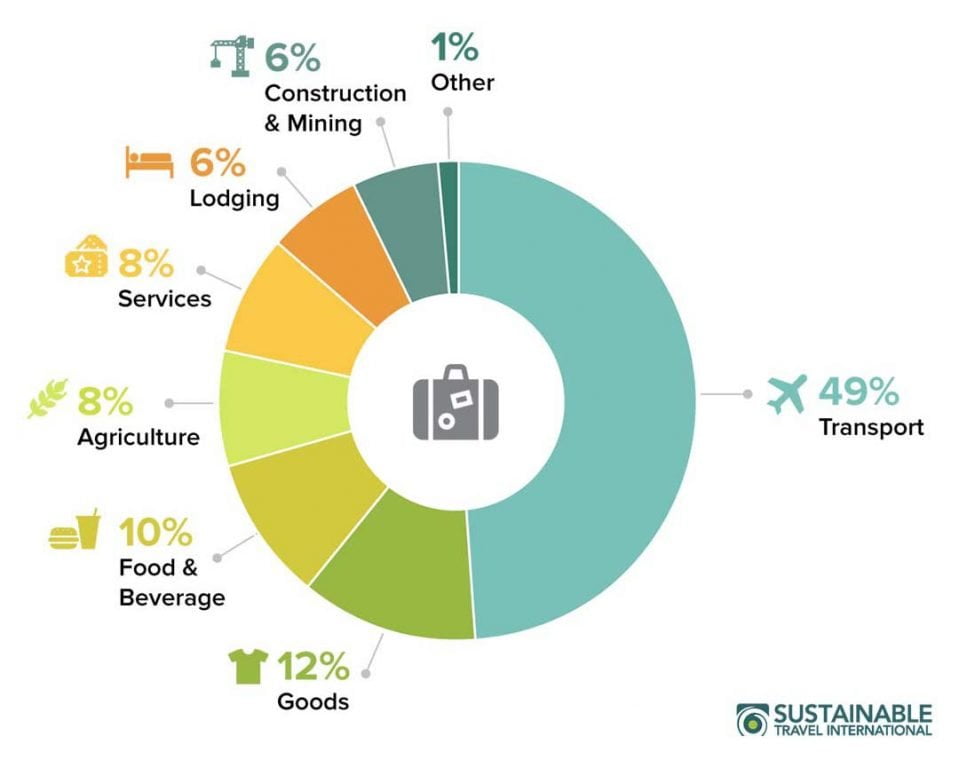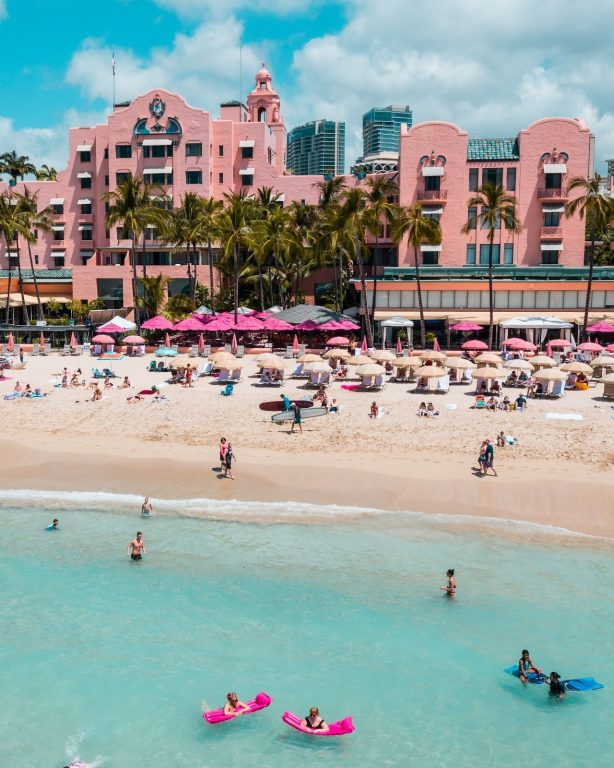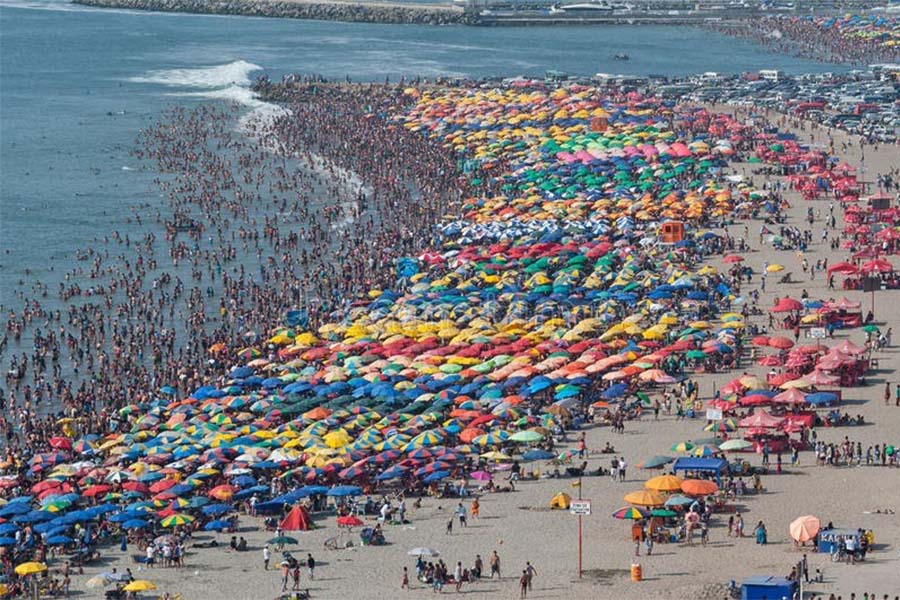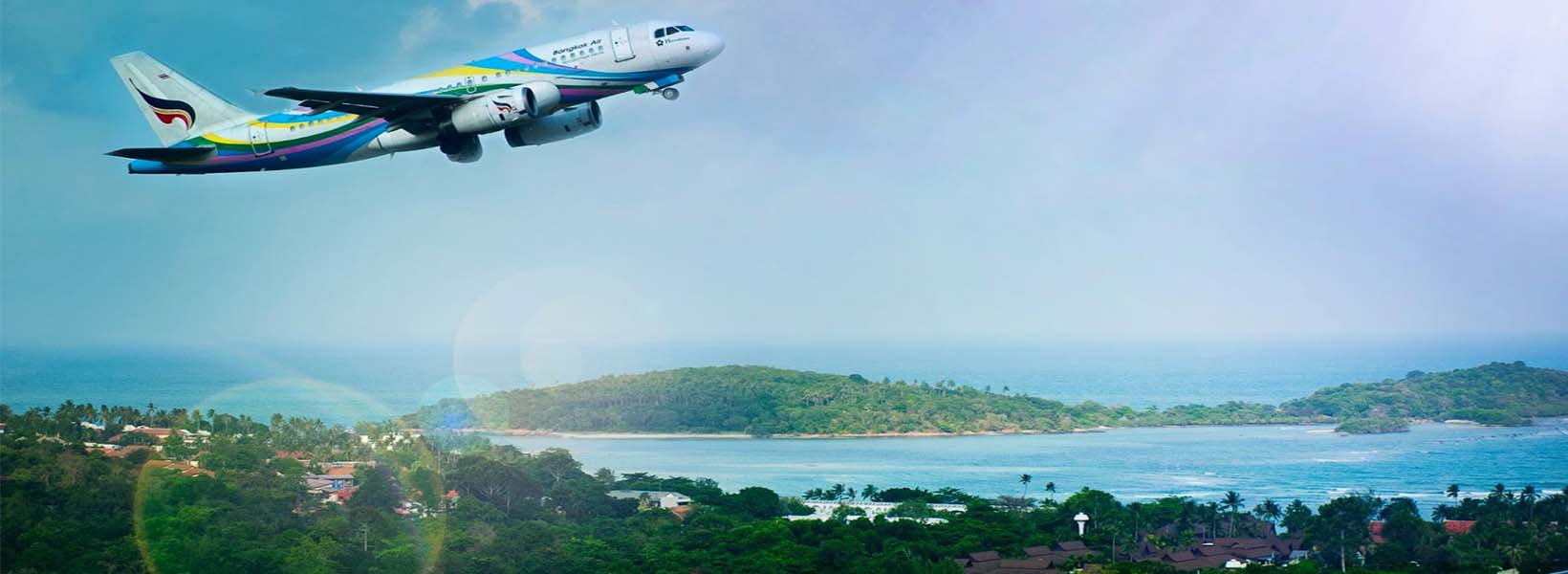Introduction
It is a tragic irony that, while many island territories are highly dependent on tourism in order to drive economic growth and survival, it is the travel industry which brings tourists to these shining shores that produces around 8% annually of carbon dioxide (CO2) emissions globally. CO2 emissions contribute to global warming which will eventually further exacerbate the existential crisis caused by rising sea levels that confronts so many island communities. And therein lies the paradox: the same industry that is seen as crucial to economic survival is also the main element in impending destruction. It is for this very reason that sustainable tourism for islands is being brought into greater focus.
Carbon Footprint of Global Tourism

What is meant by island tourism?
Travel to islands is a specific form of tourism that often requires special consideration, as there are distinctive aspects of islands, such as fragile ecosystems, as well as historical and sociocultural aspects that create unique challenges to developing a successful and sustainable tourism destination.
Proper development and management of tourism as an economic activity in island environments has to take a number of factors into consideration. These include waste management, the supply chain, transportation, hospitality services and policy-making.
What role does tourism play in the development of islands?
According to Taleb Rifai, the Secretary General of the World Tourism Organisation, “Tourism can play a key role in a stronger support to the development agenda of the SIDS considering that the sector is the mainstay for the economies of many SIDS, and that due to the vulnerabilities, the SIDS remain a special case for sustainable tourism development.”
Sententiments like this demonstrate that tourism is at the heart and soul of fostering growth and development for island nations around the world. In fact, tourism accounts for more than one-quarter of the Gross Domestic Product (GDP) in a number of SIDS, and makes up 9% of the overall exports (US$61 billion).
Furthermore, the industry provides a level of competitiveness in the international market for island territories that are isolated because of their location. The opportunities presented by a functioning tourism sector include employment, the promotion and protection of natural resources, and the exploration of Blue Economy and Green economy.
Economic and social impacts of tourism in islands
The prevalence of the tourism industry has presented a mixture of positive and negative impacts on island communities. It is undeniable that tourism creates a significantly positive contribution to GDP, as well as employment opportunities. This can be used as a foundation upon which to achieve greater economic diversity, which then leads to an improved standard of living.
Generally speaking, some of the negative impacts which occur, do so as a result of there being an over-dependence on tourism as a main source of economic growth. This overdependence can lead to the neglect of other vital sectors, such as agriculture and manufacturing. Also, if tourism is predominantly seasonal, this produces an economic disparity during off-season. This phenomenon of seasonality causes there to be a fluctuation in the number of visitors to particular destinations, with a corresponding fluctuation in the disposable income that can be used to purchase local goods.
The presence of tourists may also inculcate social divisions between visitors and the local population, as many jobs for local people in the tourist industry are in the service industry, such as housekeepers, waiters, butlers, or gardeners. Often, visitors tend to have greater economic resources than the inhabitants of their chosen destination, which can create some social tension.
In addition to all of this, there can be negative environmental consequences which occur as a result of facilitating the presence of tourists. Airport upgrades and hotel construction have the potential to cause the destruction of native forests, flora and fauna.
Environmental impact of tourism facilities
Tourism development usually involves the construction of hotels, resorts and other amenities catered to tourists. This may result in a scarcity of land, and the exclusion of the local population from Lagoon areas.
Often, coastal areas are seen as most attractive to tourists who wish to experience an island’s natural beauty. Construction along coastlines, without comprehensive consideration of environmental impacts, results in the destruction and degradation of coastal ecosystems and coral reefs. Other negative effects include soil erosion, changes in water runoff, and potential storm damage because of their exposed location. Additionally, water scarcity is further exacerbated when golf courses are built on, and irrigation systems are prioritised for the maintenance of these spaces.
The presence of Hotels also produces a strain on waste management facilities because the sewage from large hotels can be a source of pollution if it is not treated and disposed of properly. While most hotel chains include wastewater treatment plants, these can be difficult to maintain in the islands and need to be monitored regularly. The production of solid waste can also add to the existing solid waste disposal problems on many islands.

Tourism infrastructure development
There are many infrastructural elements to take into account when conducting development of any island location in order to cater to the presence of tourists. Airports need to be outfitted to accommodate large airplanes to bring tourists, and there also need to be docking facilities for cruise ships. Roads may have to be built and or improved to resort sites or to carry tour buses. There must be the adequate provision of utilities, such as water and electricity, which sometimes puts a strain on the local grid. While these projects can result in improved convenience for the local population by, for example, improving access to remote areas and making travel more convenient, the possible infrastructural damage must be taken into consideration.
What is sustainable tourism?
Sustainable tourism is defined by the UN Environment Program and the UN World Tourism Organization as “tourism that takes full account of its current and future economic, social and environmental impacts, addressing the needs of visitors, the industry, the environment and host communities.” This illustrates that, for it to be truly sustainable, tourism must take into account the needs of all stakeholders, and adopt policies that are cognizant of the intergenerational effects of both its positive and negative impacts.
In essence, sustainable tourism also has to encompass cultural, environmental, social and economic perspectives to facilitate the active engagement of all stakeholders, and achieve long-term collaboration. Taking greater advantage of technology by exploring digital tourism is also an option to explore. For example, The Faroe Islands is championing a “remote tourism” revolution to help potential travellers experience the islands and hopefully encourage them to visit in the future. This digital tourism initiative would allow islands to broadcast tour guides live for people from around the world to log in and watch these guides trek around tourist destinations.
Responsible travel
Sustainable tourism has emerged from the behaviour and choices of individual travellers who are striving to align their efforts with the creation of a more sustainable world. Ideally, these travellers focus on optimising positive impact, while as far as possible minimising any negative effects of their presence on a tourism destination. Consumers are taking the concept of sustainability more seriously as global consciousness surrounding the issue has evolved, and the market has responded by offering better choices and modes of travel. There are particular nice areas of the market, including agritourism, green tourism, and ecotourism. Responsible travel and responsible tourism seek to form a remedy to overtourism, a term which will be explored later on in this post.
Ecotourism
The concept of ecotourism amalgamates sustainable tourism and responsible travel, and facilitates the protection of the natural environment, biodiversity, and cultural and historical heritage. Tourists can therefore contribute to the strengthening of ecological resources, which can be starkly contrasted with more passive, traditional forms of tourism. The primary goals of ecotourism should be to decrease activities with negative environmental impacts, and to include local residents and the indigenous community when evaluating potential ecotourism development.
Trends for sustainable island tourism in 2022
Generally, the concept of sustainable travel is becoming more and more mainstream in the industry, with Google recording a 70% rise in the number of people searching for sustainable travel options in 2021. Travellers to islands are becoming more and more socially and environmentally aware, and are finding ways to nurture their adventurous spirit while having a positive impact on the cultures and ecosystems encountered during their journeys.
Beyond being sustainable, the process of travel can now be regenerative, and put the needs of the host community first. This holistic, inclusive approach nurtures mutual respect and facilitates tolerance, and authentic cultural exchange. Regenerative tourism is characterised by a mission to not just avoid damage, but actually create a positive impact on destinations and communities.
Remote work programs
The digital nomad and remote work movement emerged as one of the adaptive strategies of the COVID-19 pandemic, and illustrated the need to slow down and embrace a better quality of life. In fact, the pandemic actually accelerated trends in remote work, and has provided a degree of visitor diversity which is fundamental in helping island economies to recover. In comparison to tourists, remote workers have extended stays, return more frequently and recommend destinations within digital nomad communities. There is a wide variety of remote work programs based on islands to choose from, all of which are specifically suited to the many needs of digital nomads!
Learn how you can live and work from the Mediterranean island nation of Malta at our webinar.
Carbon neutral travel and carbon offsetting
Carbon offsetting refers to the process of compensating for the carbon dioxide emissions arising from human activity. This is of particular interest to the tourist industry, which is one of the largest contributors to global greenhouse gas emissions. These are currently forecasted to increase by 25% by 2030, so it has therefore become an urgent priority to scale up climate action in tourism.
Stakeholders in the industry are finding innovative ways to make their operations carbon neutral. These efforts include strengthening the measurement and disclosure of CO2 emissions in tourism, accelerating the decarbonization of tourism operations, and engaging the tourism sector in carbon removal. This type of management is also instrumental in the prevention of overtourism.
A spotlight on overtourism
The World Tourism Organisation defines the term “overtourism” as destinations where hosts or guests, locals or visitors, feel that there are too many visitors and that the quality of life in the area or the quality of the experience has deteriorated unacceptably
Stakeholders in the industry are finding innovative ways to make their operations carbon neutral. These efforts include strengthening the measurement and disclosure of CO2 emissions in tourism, accelerating the decarbonization of tourism operations, and engaging the tourism sector in carbon removal. This type of management is also instrumental in the prevention of overtourism.

It is the opposite of the responsible tourism outlined earlier, which is about using tourism to make better places to live in and better places to visit. While overtourism is often thought about as occurring in an urban framework, it is definitely an issue in island territories, and has already threatened the ecosystems and biodiversity hotspots of destinations such as Thailand, the Pacific Islands, the Philippines, and Indonesia.
Any measures to combat overtourism cannot focus only on altering tourist visitor numbers and tourist behaviour, but should also encompass the needs and viewpoints of local stakeholders. This will ensure the propagation of the positive, sustainable aspects of tourism while encouraging a sense of community empowerment for local residents.
Conclusion
The tourism industry can provide many benefits to both travellers and host destinations, once a holistic, sustainable and regenerative approach is taken. After all, the human spirit thrives on the expansion of literal and figurative horizons, and what better way to do this, than to travel!
To learn more about ways to embark on journeys that can be catergorised as responsible tourism, please see our archives for access to our webinars that have explored this theme.





